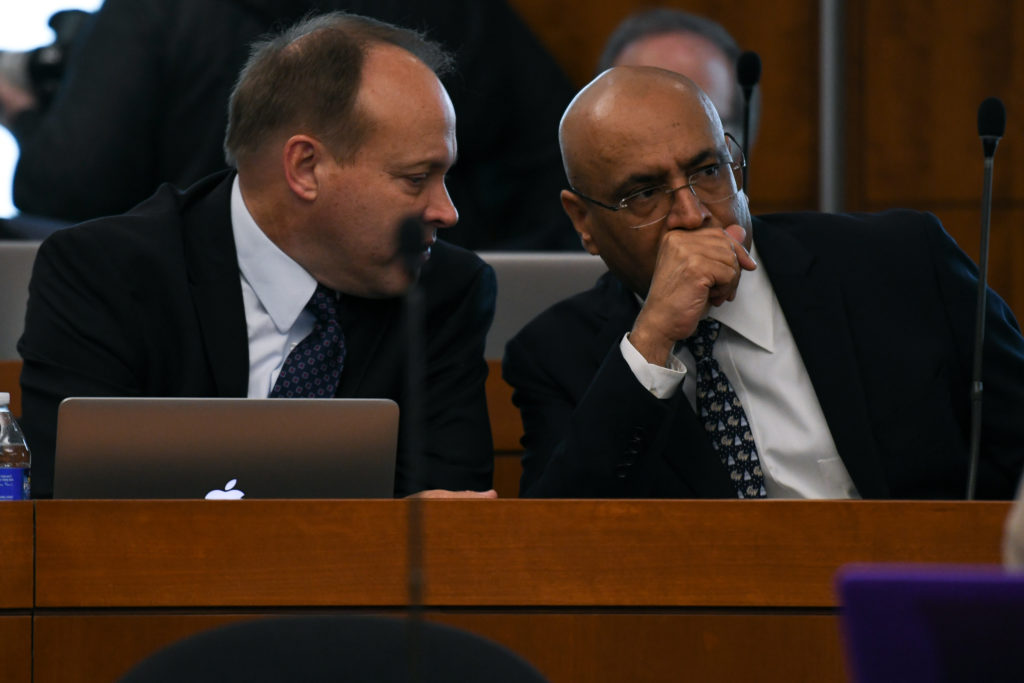Updated: Oct. 9, 2018 at 9:02 p.m.
The business school missed its projected graduate enrollment this year by nearly 30 percent, resulting in a multimillion-dollar revenue shortage, faculty said.
In a meeting with business school faculty Sept. 7, the school’s new dean said enrollment dropped by about 17 percent between 2017 and 2018, though officials had anticipated a roughly 19 percent increase, according to five faculty who attended the meeting. About 500 students enrolled in the business school’s graduate programs this year, according to a PowerPoint slide from the dean’s presentation, which was obtained by The Hatchet.
Thirteen of the 17 graduate programs missed their projected enrollments for the fiscal year 2018 budget, according to the slide. The business school’s overall enrollment in master’s programs has been steadily declining since 2012, decreasing by nearly 16 percent over five years, according to institutional data.
Of the highest deficits, the Global Master of Business Administration program was expected to accommodate 80 students in 2018 but instead enrolled 50, according to the slide. With a tuition of roughly $105,000, the global program’s shortage alone cost the business school more than $3 million.
The international Master of Science in Finance, which offers classes in Suzhou, China, also enrolled 22 students fewer than anticipated, according to the slide – running a $1.5 million loss.
University spokesman Jason Shevrin said the school’s enrollment was discussed at a recent meeting between faculty and administrators, but officials didn’t discuss changing any existing programs. He said the school is always considering how to prioritize students and be prepared for “shifts in the global marketplace.”
“The business school will continually examine all its programs while it strives to align its offerings with the needs of its students and the demands of the marketplace,” he said.
Shevrin declined to confirm that graduate enrollment dropped by about 17 percent. He declined to say why enrollment declined or how officials reacted to the enrollment drop.
He declined to say what the business school’s deficit is after the enrollment downturn and how the decrease will affect the school and GW as a whole.
Shevrin also declined to say how the newly created assistant dean of graduate recruitment and admissions position – which was posted online Sept. 6 – would help increase enrollment in the school’s graduate programs. He declined to say when or why officials created the position.
The business school has faced a series of budget concerns in recent years, after former business school Dean Doug Guthrie was fired in 2014 for overspending $13 million. Linda Livingstone, who took Guthrie’s place, set up a repayment plan that included administrative budget cuts that will continue through 2020.
Livingstone left the school in spring 2017 to become the president of Baylor University.
Business school faculty said Anuj Mehrotra, the dean of the school, said at the meeting earlier this month that he is considering bringing in more postdoctoral fellows – researchers with doctorates – to cut costs and make up for the multimillion-dollar loss of expected revenue. The faculty said Mehrotra also announced the assistant dean position at the gathering.
A business school professor – who attended the meeting and spoke on condition of anonymity for fear of retribution from business school officials – said roughly 50 faculty members attended the meeting on Sept. 7. They said that if enrollment continues to decline, the master’s programs could become too small to be considered for ranking, which could cost them potential students.
“It’s a downward spiral – you don’t get ranked, so you don’t attract students,” they said.
Other professors said they were not concerned about the revenue loss in the short term because enrollment fluctuates from year to year.
Pradeep Rau, a professor of marketing who attended the meeting, said officials did not provide a clear pathway to make up for the loss at the meeting, but he said the dean indicated that he was negotiating with administrators to find a solution.
“Oftentimes admin is quite helpful in trying to cook up some kind of arrangement,” he said.
Rau added that if postdoctoral fellows are brought into the program, they should not be used primarily to teach doctoral students – though doing so would save money. He said postdoctoral fellows should conduct research to build their resumes and grow their reputations.
James Bailey, a professor of leadership, said the downturn this year is likely a result of increased competition from other graduate school programs. The market of business schools is saturated, and schools have to market themselves more each year to attract students, he said.
“More competition would lead me to believe that a temporary downturn is not a long-term concern,” Bailey said.
He said Mehrotra’s suggestion to add more postdoctoral fellows is not a cut from the doctoral program. Postdoctoral fellows do the same job as faculty without getting the same paycheck, Bailey said.
Most postdoctoral fellows are paid about $47,000 annually. In 2015, the average pay for a full-time faculty member was about $160,000, while assistant and associate professors were paid about $109,000 and $88,000, respectively.
Bailey said that because the fellows have already completed their degrees, they can work with doctoral students and do research at the same time.
“It’s a win-win kind of solution,” he said.
YoungKi Park, an assistant professor of information systems and technology management, said the information from the meeting was not surprising because graduate students are gravitating toward more specialized technology degrees.
“The general program doesn’t work anymore, so we have to make more sophisticated, more customized that reflects the changing environment,” he said.
Dani Grace and Parth Kotak contributed reporting.
This post was updated to reflect the following correction:
The Hatchet incorrectly reported that the international Master of Science in Finance is headquartered in Beijing, China. It is headquartered at the business school in D.C., but students also take courses in Suzhou, China. We regret this error.





